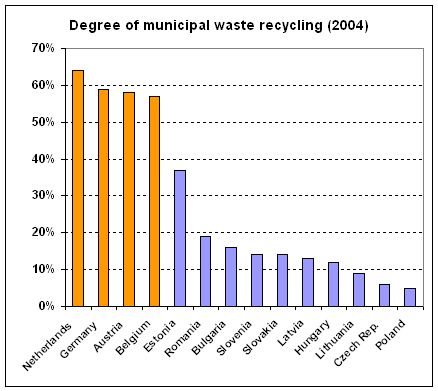Waste

Source: Eurostat 2007
EU funds are an opportunity to improve recycling services…
The average CEE household still produces much less waste than one in Western Europe. At the same time, most CEE countries recycle only 10% or less of their municipal waste, compared with more than 50% in Germany or the Netherlands. The priority for CEE countries in the upcoming years should be to prevent increases in waste volumes, while rapidly increasing recycling. With a focused effort and investment of EU funds, the new member states could develop into recycling societies within a decade.
…but incineration companies are eyeing the money
EU waste policy explicitly promotes prevention and recycling of waste over incineration and landfilling. However, there are pressures to instead divert much of the EU money into promoting waste incineration, which would perpetuate an unsustainable and uneconomic approach to waste for many years to come. In Poland, for example, there is a plan to spend EU funds on nine large municipal waste incinerators at a cost of over €1bn in the 2007-2013 period – this would consume most of Poland’s Cohesion Fund money for waste management. The EU should prevent such misguided investment.
Incinerators – a waste of public money
Incinerators, even if they produce energy by burning waste, are not a good investment of public money because they:
- squander precious materials that could be reused or recycled, thus necessitating imports of increasingly expensive new raw materials from around the world at a huge cost to national economies
- produce high CO2 emissions, thus contradicting efforts to limit climate change
- harm surrounding communities with toxic pollution and generate toxic ash
- will face public protests, leading to difficulties with getting construction permits, thus jeopardising the full absorption of EU funds
- block development of waste prevention and recycling because incinerators require a constant input of large amounts of mixed waste for decades in order to be profitable.
Recycling – better for the economy
- Every tonne of waste that is reused or recycled avoids the extraction, processing and importation of new resources.
- Recycling saves several times more energy than incinerators are able to produce by burning waste.
- Recycling has lower investment and operation costs: a euro spent on recycling services will handle more waste than a euro spent on incineration.

